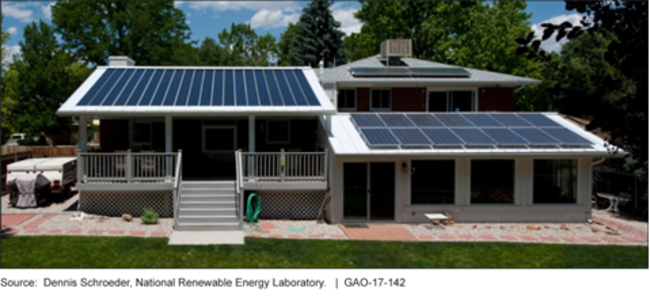Avid supporters of coal, oil, and gas (and opponents of wind and solar energy, but I repeat myself) seem convinced that they’ve got the ultimate gotcha arguments in “intermittency” and “energy density.” They’re right, but not in quite the way they seem to think.
What does “intermittency” mean? It’s pretty simple: The sun doesn’t shine all the time, so solar panels can’t produce energy 24/7. Wind is even more “intermittent,” or at least less predictable. A windmill or wind turbine may or may not generate energy at any particular time, depending on whether there’s a decent breeze.
“Energy density” gets more complicated, but the simplified version looks something like this: A given volume or area of space and fuel dedicated to one kind of energy production is more efficient than another. An acre dedicated to a nuclear reactor or a fossil fuel power plant (and the nuclear material or, say, coal) produces a LOT more energy than an acre covered with solar panels or wind turbines. In fact, it’s questionable whether there are enough acres on Earth to meet humanity’s energy needs with “renewables,” at least if those acres have to be dedicated entirely to energy generation.
The opponents of “renewables” would seem to enjoy an advantage on these arguments. But not so fast.
With respect to density, it’s true that land dedicated to nuclear reactors and e.g. coal-fired power plants has to be dedicated pretty much entirely to those facilities and activities. On the other hand, a rooftop solar panel or wind turbine on a home takes up little or no net additional space at all. You’re not using the roof for other activities, and it would still be there if you didn’t need electricity. Batteries and such take up SOME space, but not much, and may be installed inside a home’s walls. You’re basically getting multiple uses from the same space.
As for intermittency, I just mentioned batteries. You can generate more energy than you’re using when the sun is out or the wind is blowing, and use the stored excess energy when it isn’t.
And it’s not like fossil fuels, especially delivered through an increasingly unreliable “grid” system, aren’t also intermittent. Even setting aside military attacks on production and distribution infrastructure like we’re seeing in Ukraine, and the growing phenomenon of localized sabotage here in the United States, we experience energy interruptions all the time.
Transformers blow. Drunk drivers, hurricanes, or ice storms take lines down or flood/freeze pumps. Trains full of coal derail. Pipelines leak.
When those problems occur, “intermittency” goes to “non-existence,” and “density” falls to zero, until they’re fixed, for every customer downstream of the problems.
If a squirrel chews through the wires connecting your solar panels to your internal home “grid,” your neighbor’s refrigerator doesn’t miss a beat.
I’m writing this column after sunset, on a computer operating from stored energy generated by a non-grid-connected solar panel. No intermittency, sufficient density for my purposes, and independence from sprawling and vulnerable systems.
Your move, fossils.
Thomas L. Knapp (Twitter: @thomaslknapp) is director and senior news analyst at the William Lloyd Garrison Center for Libertarian Advocacy Journalism (thegarrisoncenter.org). He lives and works in north central Florida.
PUBLICATION/CITATION HISTORY



